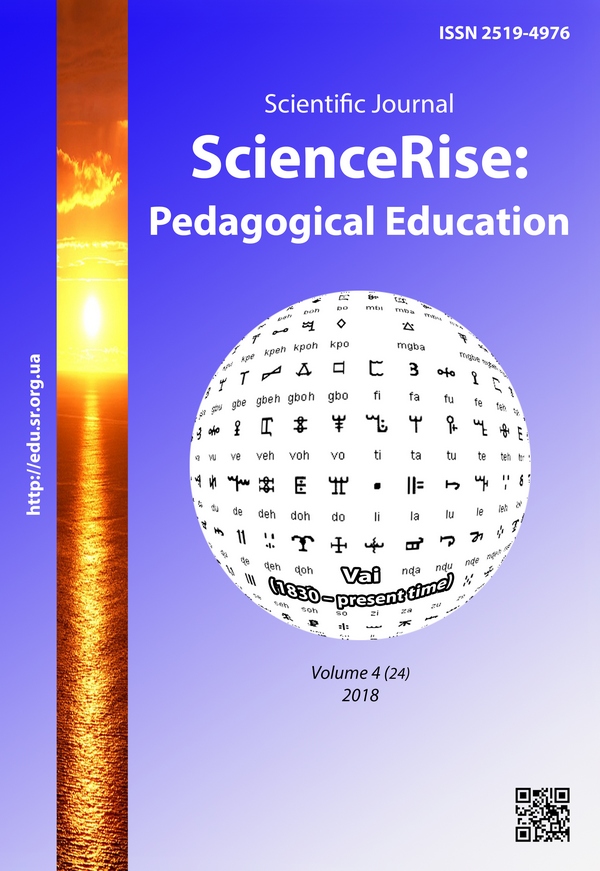Conceptual bases of interactive learning at higher military school
DOI:
https://doi.org/10.15587/2519-4984.2018.132656Keywords:
interaction, dialogue, discourse, intersubjectivity, integration, communication, cooperation, partnership, interpretation characterAbstract
The article is devoted to the urgent problem of conceptualization of interactive learning at higher military school. There were analyzed diachronic aspects of constructing the intersubjective educational interaction from the positions of ancient dialectics and philosophical ethics, German idealistic philosophy, in the context of newest and modern philosophical theories of communicative interaction. The methodological ground of constructing the interactive educational process at higher military school is defined as ideas of representatives of classic philosophy about the determining role of interaction in the dialectic process of cognition of the objective world; existential philosophy about developing an active, conscious, responsible person with reflection, freedom and right for choice of own position in interactive communication; philosophy of pragmatism, symbolic interactionism, communicative philosophy about achieving accordance between communicants in the modern multicultural world, conditions of the constructive communicative discourse; representatives of philosophical hermeneutics and synergetics about non-linearity, openness, dialogism, interpretation character of the modern educational process.
Based on the conducted study, it was established, that interactive learning is considered as a leading sign of the modern educational process, determines the necessity of setting the active interpersonal interaction, joint mutually connected activity of its main participants. Organization of the educational process at higher military school must be realized based on synergetic ideas of non-linearity, acmeology and axiology that provide the open, dialogue, co-creative, value character of interaction between subjects of interactive learning, its technologism
References
- Kremen, V. H. (Ed.) (2014). Synerhetyka i osvita. Kyiv: Instytut obdarovanoi dytyny, 348.
- Vitchenko, A. O., Osodlo, V. I., Salkutsan, S. M.; Telelyma, V. M. (Ed.) (2016). Tekhnolohii navchannia u vyshchii viiskovii shkoli: teoriia i praktyka. Kyiv: NUOU im. Ivana Cherniakhovskoho, 250.
- Kremen, V. H. (Ed.) (2008). Entsyklopediia osvity. Kyiv: Yurinkom Inter, 1040.
- Filosofskyi entsyklopedychnyi slovnyk (2002). Kyiv: Abrys, 751.
- Platon; Losev, A. F., Asmus, V. F. (Eds.) (2006). Sochineniya v chetyrekh tomakh. Vol. 1. Saint Petersburg: Izd-vo S.-Peterb. un-ta; Izd-vo Olega Abyshko, 632.
- Plutarkh (1961). Sochineniya v trekh tomakh. Vol. 1: Sravnitel'nye zhizneopisaniya. Moscow: Iz-vo Akademii nauk SSSR, 502.
- Kant, I.; Asmus, V. F., Gulyga, A. V., Oyzerman, T. I. (Eds.) (1964). Sochineniya v shesti tomakh. Vol. 3 Moscow: Mysl, 756.
- Kant, I.; Asmus, V. F., Gulyga, A. V., Oyzerman, T. I. (Eds.) (1966). Sochineniya v shesti tomakh. Vol. 5. Moscow: Mysl, 528.
- Hegel, G. V. F. (2004). Fenomenolohiia dukhu. Kyiv: Osnovy, 548.
- Sytnychenko, L. (1996). Pershodzherela komunikatyvnoi filosofii. Kyiv: Lybid, 132–148.
- Dzheyms, U.; Efremenko, D. V. (Ed.) (2010). O nekotoroy slepote lyudey. Interaktsionizm v amerikanskoy sotsiologii i sotsial'noy psikhologii pervoy poloviny XX veka. Moscow, 10–29.
- Dobren'kov, V. I. (Ed.) (1994). Amerikanskaya sotsiologicheskaya mysl. Moscow: Izd-vo MGU, 496.
- Abel's, Kh.; Golovina, N. A., Kozlovskogo, V. V. (Eds.) (2000). Interaktsiya, identichnost', prezentatsiya. Vvedenie v interpretativnuyu sotsiologiyu. Saint Petersburg: Aleteyya, 272.
- Khabermas, Yu. (2001). Vovlechenie drugogo. Ocherki politicheskoy teorii Saint Petersburg: Nauka, 417.
- Apel, K.-O. (2009). Dyskurs i vidpovidalnist: problema perekhodu do postkonventsionalnoi morali. Kyiv: Dukh i Litera, 430.
- Prigozhin, I., Stengers, I.; Arshinova, V. I., Klimontovicha, Yu. L., Sachkova, Yu. V. (Eds.) (1986). Poryadok iz khaosa; Novyy dialog cheloveka s prirodoy. Moscow: Progress, 432.
Downloads
Published
How to Cite
Issue
Section
License
Copyright (c) 2018 Nataliia Zamotaieva

This work is licensed under a Creative Commons Attribution 4.0 International License.
Our journal abides by the Creative Commons CC BY copyright rights and permissions for open access journals.
Authors, who are published in this journal, agree to the following conditions:
1. The authors reserve the right to authorship of the work and pass the first publication right of this work to the journal under the terms of a Creative Commons CC BY, which allows others to freely distribute the published research with the obligatory reference to the authors of the original work and the first publication of the work in this journal.
2. The authors have the right to conclude separate supplement agreements that relate to non-exclusive work distribution in the form in which it has been published by the journal (for example, to upload the work to the online storage of the journal or publish it as part of a monograph), provided that the reference to the first publication of the work in this journal is included.







